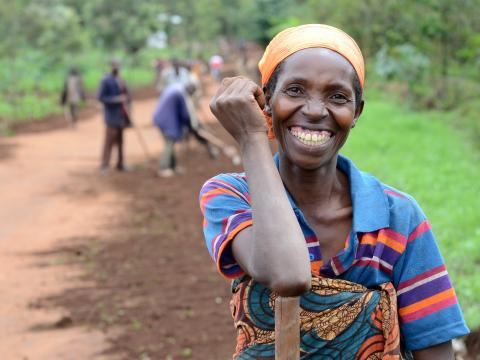Cash: the glue that binds humanitarian and development work

By Kathryn Taetzsch
Global Director, Cash-Based Programming
World Vision International
For too long, as practitioners of good aid, development and peacebuilding, many in our profession have seen these areas of work as separate domains and not part of a bigger, holistic agenda serving those in need no matter their circumstances. The time has come to recognise that any distinction between those involved in humanitarian and development and peacebuilding is artificial, especially for those on the receiving end of any intervention.
Children and their families affected by humanitarian crises, extreme poverty and injustice often face more than one challenge; a lack of food, an inability to access government services and markets, a lack of access to land for cultivation to exclusion from access to quality education. Which is why a one-size-fits-all approach just doesn’t work; our responses must be as varied as the problems one family faces.
What it looks like in reality
When disaster shocks like it did last following the tsunami in Indonesia last year, we draw on our strengths as an organisation with a strong community presence. In Sulawesi, our long-term development programmes moved to focus on survival, recovery and resilience for more than 80,000 affected people.
And this is where we see the huge benefits of using cash-based programming. In times of crisis, cash transfer assistance can provide immediate benefits but also help tackle the underlying poverty that meant so many were particularly vulnerable when the crushing waves hit in the first place.
Cash based assistance needs to be market-based, Government-facilitated and linked with meaningful long-term work, such asa programme to build secure livelihoods and therefore greater resilience for the future.
Cash and voucher-based programmes also provide greater dignity of choice to people affected by disaster, and an ability to withstand future shocks.
How we do it in World Vision
World Vision promotes the links and opportunities that cash-based programming offers. We aim to help those who are most vulnerable from recurring shocks to their prosperity move towards greater empowerment and economic self-reliance.
Cash assistance can:
-
Provide building blocks for people to improve their livelihoods which in turn will help them to access better financial products and promote self-reliance and economic security in the future.
-
Enable Child Sensitive Social Protection=- this includes all family or child-focused social protection measures which address children’s needs or rights and improve child well-being, as well as assuring that all social protection measures maximise impacts and minimise harm on girls and boys.
-
Provide choices for refugees and other particularly vulnerable groups, about the needs they choose as the most important to address.
-
Help ensure people are not forced to sell their productive assets in the early stages of an emergency response, meaning they will have greater resilience in the future.
The delivery of a cash grant alone is not enough to transform people’s lives. The ability to use cash to empower people through periods of fragility and vulnerability is where World Vision’s development and humanitarian work inevitably overlap.
In addition to partnering with Governments and the private sector, joining the dots to larger initiatives such as the Sustainable Development Goals will bring a greater degree of sustainability to our work - and ultimately, greater impact for children made vulnerable by poverty, injustice and humanitarian crises.

